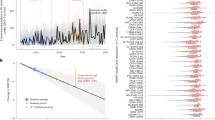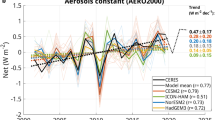Abstract
The growth in anthropogenic CO2 emissions experienced since the onset of the Industrial Revolution is the most important disturbance operating on the Earth’s climate system1. To avoid dangerous climate change, future greenhouse-gas emissions will have to deviate from business-as-usual trajectories2. This implies that feedback links need to exist between climate change and societal actions. Here, we show that, consciously or otherwise, these feedbacks can be represented by linking global mean temperature change to the growth dynamics of CO2 emissions. We show that the global growth of new renewable sources of energy post-1990 represents a climate–society feedback of ∼0.25% yr−1 per degree increase in global mean temperature. We also show that to fulfil the outcomes negotiated in Durban in 2011, society will have to become ∼ 50 times more responsive to global mean temperature change than it has been since 1990. If global energy use continues to grow as it has done historically then this would result in amplification of the long-term endogenous rate of decarbonization from −0.6% yr−1 to ∼−13% yr−1. It is apparent that modest levels of feedback sensitivity pay large dividends in avoiding climate change but that the marginal return on this effort diminishes rapidly as the required feedback strength increases.
This is a preview of subscription content, access via your institution
Access options
Subscribe to this journal
Receive 12 print issues and online access
$209.00 per year
only $17.42 per issue
Buy this article
- Purchase on Springer Link
- Instant access to full article PDF
Prices may be subject to local taxes which are calculated during checkout

Similar content being viewed by others
References
Pachauri, R. K. & Reisinger, A. (eds) IPCC Climate Change 2007: Synthesis Report (Cambridge Univ. Press, 2007).
Meinshausen, M. et al. Greenhouse-gas emission targets for limiting global warming to 2 °C. Nature 458, 1158–1162 (2009).
Boden, T. A., Marland, G. & Andres, R. J. TRENDS: A Compendium of Data on Global Change (Carbon Dioxide Information Analysis Center, Oak Ridge National Laboratory, US Department of Energy, 2010).
Houghton, R. A. TRENDS: A Compendium of Data on Global Change (Carbon Dioxide Information Analysis Center, Oak Ridge National Laboratory, US Department of Energy, 2010).
Peters, G. P. et al. Rapid growth in CO2 emissions after the 2008–2009 global financial crisis. Nature Clim. Change 2, 2–4 (2012).
Raupach, M. R. et al. Global and regional drivers of accelerating CO2 emissions. Proc. Natl Acad. Sci. USA 104, 10288–10293 (2007).
Raupach, M. R. & Canadell, J. G. Carbon and the anthropocene. Curr. Opin. Environ. Sustainability 2, 210–218 (2010).
Grübler, A. World Primary Energy Use http://www.iiasa.ac.at/~gruebler/Data/TechnologyAndGlobalChange/w-energy.csv.
British Petroleum BP Statistical Review of World Energy http://www.bp.com/assets/bp_internet/globalbp/globalbp_uk_english/reports_and_publications/statistical_energy_review_2011/STAGING/local_assets/spreadsheets/statistical_review_of_world_energy_full_report_2011.xls.
Garrett, T. Are there basic physical constraints on future anthropogenic emissions of carbon dioxide? Climatic Change 104, 437–455 (2011).
Grübler, A. & Nakićenović, N. Decarbonising the global energy system. Technol. Forecast. Soc. Change 53, 97–110 (1996).
Hare, W. & Meinshausen, M. How much warming are we committed to and how much can be avoided? Climatic Change 75, 111–149 (2006).
Enting, I. G., Wigley, T. M. L. & Heimann, M. Future Emissions and Concentrations of Carbon Dioxide: Key Ocean/Atmosphere/Land Analyses Research technical paper no. 31 (CSIRO Division of Atmospheric Research, 1994).
Wigley, T. M. L., Richels, R & Edmonds, J. A. Economic and environmental choices in the stabilization of atmospheric CO2 concentrations. Nature 379, 240–243 (1996).
Kronsik, J. A., Holbrook, A. L., Lowe, L. & Visser, P. S. The origins and consequences of democratic citizens’ policy agendas: A study of popular concerns about global warming. Climatic Change 77, 7–43 (2006).
Spence, A., Poortinga, W., Butler, C. & Pidgeon, N. F. Perceptions of climate change and willingness to save energy related to flood experience. Nature Clim. Change 1, 46–49 (2011).
Ding, D., Maibach, E. W., Zhao, X., Roser-Renouf, C. & Leiserowitz, A. Support for climate policy and societal action are linked to perceptions about scientific agreement. Nature Clim. Change 1, 462–465 (2011).
Hammitt, J. K., Lempert, R. J. & Schlesinger, M. E. A sequential-decision strategy for abating climate change. Nature 357, 315–318 (1992).
Schneider, S. H. & Mastrandrea, M. D. Probabilistic assessment of dangerous climate change and emissions pathways. Proc. Natl Acad. Sci. USA 102, 15728–15735 (2005).
Den Elzen, M. G. J., Schaeffer, M. & Lucas, P. Differentiation of future commitments based on Parties’ contribution to climate change. Climatic Change 71, 277–301 (2005).
UNFCCC Draft Decision-/CP.17. Durban, South Africa; available at http://unfccc.int/resource/docs/2011/cop17/eng/l10.pdf.
Jevons, W. S. The Coal Question (Macmillan, 1865).
Stern, N. Stern Review on the Economics of Climate Change (HM Treasury, 2006).
Hasselmann, K. Conventional and Bayesian approach to climate-change detection and attribution. Q. J. R. Meteorol. Soc. 124, 2541–2565 (1998).
Jarvis, A. J., Leedal, D. T., Taylor, C. J. & Young, P. C. Stabilizing global mean surface temperature: A feedback control perspective. Environ. Modelling Softw. 24, 665–674 (2009).
Sims, R. E. H. et al. in IPCC Climate Change 2007: Mitigation (eds Metz, B., Davidson, O. R., Bosch, P. R., Dave, R. & Meyer, L. A.) (Cambridge Univ. Press, 2007).
Jones, P. D., Parker, D. E., Osborn, T. J & Briffa, K. R. Global and Hemispheric Temperature Anomalies—Land and Marine Instrumental Records http://www.cru.uea.ac.uk/cru/data/temperature/hadcrut3gl.txt.
Acknowledgements
We thank P. Young and M. Raupach for their comments on early drafts of the manuscript. A. Grübler kindly supplied the global primary energy-use data. A.J.J. and D.T.L. were supported under EPSRC research grant EP/I014721/1. C.N.H. was supported by Lancaster University.
Author information
Authors and Affiliations
Contributions
A.J.J. conceived and carried out the analysis. A.J.J., D.T.L. and C.N.H. wrote the paper.
Corresponding author
Ethics declarations
Competing interests
The authors declare no competing financial interests.
Supplementary information
Supplementary Information
Supplementary Information (PDF 356 kb)
Rights and permissions
About this article
Cite this article
Jarvis, A., Leedal, D. & Hewitt, C. Climate–society feedbacks and the avoidance of dangerous climate change. Nature Clim Change 2, 668–671 (2012). https://doi.org/10.1038/nclimate1586
Received:
Accepted:
Published:
Issue Date:
DOI: https://doi.org/10.1038/nclimate1586
This article is cited by
-
Temperature difference-enhanced salinity gradient energy conversion enabled by thermostable hydrogel membrane with anti-swelling property
Nano Research (2023)
-
Harnessing blue energy with COF membranes
Nature Nanotechnology (2022)
-
Adaptive mitigation strategies hedge against extreme climate futures
Climatic Change (2021)
-
Does economic complexity matter for environmental degradation? An empirical analysis for different stages of development
Environmental Science and Pollution Research (2019)
-
Towards defining an environmental investment universe within planetary boundaries
Sustainability Science (2018)



